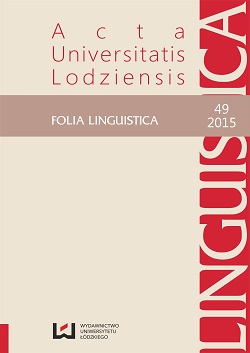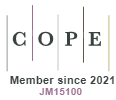Linguistic strategies in business interaction on Twitter
DOI:
https://doi.org/10.18778/0208-6077.49.02Keywords:
linguistic strategies, business interaction, TwitterAbstract
The aim of the analysis was to investigate linguistic strategies used in business interaction between clients and firms on selected business profiles on Twitter. The analysis aimed at establishing which strategies are used in the interaction. The analysis referred to the classification of strategies suggested by Zgółkowa and Pałka based on von Thun’s four-sides model of communication. Strategies used on four levels of the message were analysed, i.e. on the factual level, relationship level, self-revelation level and appeal level. The analysis indicated that strategies transposed from other media are used in the interaction. An undeniable asset of this medium is, however, the possibility to combine a range of forms of interaction and strategies.
Downloads
References
Awdiejew A., 2004, Gramatyka interakcji werbalnej, Kraków.
Google Scholar
Awdiejew A., Labocha J., Rudek K., 1980, O typologii tekstów języka mówionego, „Polonica” VI.
Google Scholar
Dąbrowska A., 2001, O sposobach zmniejszania dystansu między rozmówcami, w: G. Habrajska (red.), Język w komunikacji, t. 1, Łódź.
Google Scholar
Dekay S.H., 2012, How large companies react to negative Facebook comments, „Corporate communications: an international journal” 17 (3).
Google Scholar
DOI: https://doi.org/10.1108/13563281211253539
Drabik B., 2004, Komplement i komplementowanie jako akt mowy i komunikacyjna strategia, Kraków.
Google Scholar
Lewiński P.H., 1999, Retoryka reklamy, Wrocław.
Google Scholar
Marcjanik M., 2000, Polska grzeczność językowa, Kielce.
Google Scholar
Page R., 2014, Saying ‘sorry’: Corporate apologies on Twitter, „Journal of pragmatics” 62.
Google Scholar
DOI: https://doi.org/10.1016/j.pragma.2013.12.003
Pałka P., 2009, Strategie dyskursywne w rozmowie handlowej, Katowice.
Google Scholar
Schulz von Thun F., 2001a, Sztuka rozmawiania, t. 1: Analiza zaburzeń, Kraków.
Google Scholar
Schulz von Thun F., 2001b, Sztuka rozmawiania, t. 2: Rozwój osobowy, Kraków.
Google Scholar
Schulz von Thun F., 2002, Sztuka rozmawiania, t. 3: Dialog wewnętrzny, Kraków.
Google Scholar
Schulz von Thun F., 2006, Sztuka rozmawiania, t. 4: W porozumieniu z sobą i innymi – komunikacja i kompetencje społeczne, Kraków.
Google Scholar
Smith A.N., Fischer E., Yongjian C., 2012, How does brand-related user-generated content differ across YouTube, Facebook, and Twitter?, „Journal of interactive marketing” 26 (2).
Google Scholar
DOI: https://doi.org/10.1016/j.intmar.2012.01.002
Swani K., Brown B., Milne G., 2014, Should tweets differ for B2B and B2C? An analysis of Fortune 500 companies’ Twitter communications, „Industrial marketing management” 43.
Google Scholar
DOI: https://doi.org/10.1016/j.indmarman.2014.04.012
Zgółkowa H., 2013, Strategie komunikacyjne w rozmowach przedstawicieli handlowych z klientami, w: M. Krauz, K. Ożóg (red.), Kultura zachowań językowych Polaków, Rzeszów.
Google Scholar
Wojtak M., 2001, Strategie dyskursywne w pewnym typie tekstu dydaktycznego, w: G. Habrajska (red.), Język w komunikacji, t. 3, Łódź.
Google Scholar
Downloads
Published
How to Cite
Issue
Section
License

This work is licensed under a Creative Commons Attribution-NonCommercial-NoDerivatives 4.0 International License.










